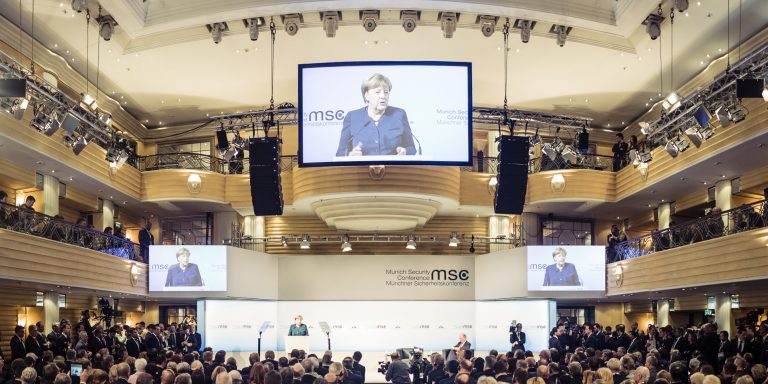INTELBRIEF
February 20, 2018
TSC IntelBrief: Concern After Munich

- The Munich Security Conference, one of the leading of such gatherings, concluded with a sense of semi-paralysis in the face of massive issues facing the participant nations.
- Conflicts and challenges such as Syria, Ukraine, Russian disinformation, the GCC, Iran, and North Korea, have all worsened since the last conference in 2017.
- While there was unanimity among speakers on the glaring need for more sustained collective approaches to defense and security, there appeared to be no progress in actually achieving such unity of vision and action.
- The U.S. continued its bifurcated foreign policy, with senior officials promoting a multilateral approach at complete odds with the White House public statements.
The Munich Security Conference (MSC), held from February 16-18, was notably more low-key than is customary for what is, perhaps, the most prestigious annual security conference. Nearly every speech and question-and-answer focused on the need for better collective and multilateral approaches to systemic crises—but answers proved elusive. On nearly every issue, including how to increase European Union defense, effectively countering Russia’s ongoing-and-consequence free disinformation campaigns in Western democracies, resolving the crisis in the Gulf Cooperation Council (GCC), and effectively addressing the Syrian civil war, conference participants stressed the need for a collective approach to issues, yet struggled to arrive at answers.
This year’s conference keynote speech was delivered by British Prime Minister Theresa May on the need to recreate a common defense framework after Britain leaves the E.U., an example of regional collective security taking two steps back and then trying to agree on one step forward. The unfolding reality of the marked turn away from multilateral frameworks by the United Kingdom with their ‘Brexit’ vote, and the U.S. with its ‘America First’ foreign/domestic policies stood in stark contrast to the rhetoric of representatives from the two countries. U.S. National Security Advisor McMaster and other U.S. officials gave speeches that were consistent with long-standing U.S. foreign policy, yet very much at odds with the current U.S. administration. Such is the divide between the public White House statements and the rest of the U.S. government, it was major news when McMaster stated the obvious, that Russia’s ‘disinformation, subversion and espionage’ campaigns against the recent U.S. presidential election was ‘now incontrovertible.’ That this would make news, and even by somewhat rebuffed to by President Trump in yet another tweet, shows the dysfunction of just one of the Munich participants at a time when a unified approach to crippling crises is crucial.
The back-and-forth allegations between Russia and the U.S. during the conference—with quote-worthy quips and barbs replacing dialogue—seemed a feature and not a bug of this year’s conference, with no real promises of progress made in the panoply of problems meant to be addressed. The ongoing, self-destructive and often childish crisis in the GCC between Saudi Arabia and the United Arab Emirates (UAE) on one side and Qatar on the other, continued, with reports of a UAE-sponsored alternative conference hosted by 25 eastern European beauty models timed to coincide with the Qatari emir’s speech on the need to ‘forget history’ and work collectively to solve their regional challenges. Ukrainian President Petro Poroshenko slammed Russia for its continued aggression in eastern Ukraine, and the continued annexation of Crimea. Russian Foreign Minister Sergei Lavrov simply dismissed the complete lack of peace talks, saying such talks were ‘openly sabotaged by Kyiv.’ Badly needed talks between Ukraine, Russia, France, and Germany—the ‘Normandy Format’—that were to be held on the sidelines of the MSC were cancelled, a sign of how far apart all parties remain on the ongoing war.
.
For tailored research and analysis, please contact: info@thesoufancenter.org